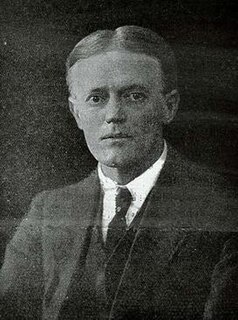Related Research Articles

The Independent Labour Party (ILP) was a British political party of the left, established in 1893, when the Liberals appeared reluctant to endorse working-class candidates, representing the interests of the majority. A sitting independent MP and prominent union organiser, Keir Hardie, became its first chairman.

George Buchanan was a Scottish patternmaker, trade union activist and Member of Parliament.
The Workers' Socialist Federation was a socialist political party in the United Kingdom, led by Sylvia Pankhurst. Under many different names, it gradually broadened its politics from a focus on women's suffrage to eventually become a left communist grouping.

Arthur MacManus (1889–1927) was a Scottish trade unionist and communist politician.

Shapurji Dorabji Saklatvala was a communist activist and British politician of Indian Parsi heritage. Saklatvala is notable for being the first person of Indian heritage to become a British Member of Parliament (MP) for the UK Labour Party, and was also among the few members of the Communist Party of Great Britain (CPGB) to serve as an MP.

The Sheffield Trades and Labour Council, usually known as the Sheffield Trades Council, is a labour organisation uniting trade unionists in Sheffield.
Peter Kerrigan was a communist activist in Britain.

John Ross Campbell MM, best known as J. R. Campbell and also as Johnny Campbell, was a British communist activist and newspaper editor. Campbell is best remembered as the principal in the so-called Campbell Case. In 1924, Campbell was charged under the Incitement to Mutiny Act for an article published in the paper Workers' Weekly. Campbell called on British soldiers to "let it be known that, neither in the class war nor in a military war, will you turn your guns on your fellow workers, but instead will line up with your fellow workers in an attack upon the exploiters and capitalists."
Aitken Ferguson was a Scottish communist activist.
James Dunlop MacDougall, also known as James McDougall, was a Scottish political activist, best known as John Maclean's leading supporter.

Robert Dunstan was a British doctor and political activist.
Frederick Shaw was a British socialist activist and trade unionist.
Glasgow Trades Council is an association of trade union branches in Glasgow in Scotland.
Rowland William Casasola, known as "Roland", was a British trade unionist and political activist.
Jim Gardner was a Scottish trade unionist.

Alfred Ewen Fletcher was a British journalist active in the labour movement.
Alexander Gossip was a Scottish trade union leader and political activist.
William Shaw was a Scottish trade unionist and politician.
Arthur George Field was a British trade unionist and socialist activist.
Hugh Hinshelwood was a Scottish communist activist and trade unionist.
References
- 1 2 3 4 "Greenock: Labour to support Mr Geddes", Glasgow Herald , 11 November 1922
- ↑ Bonhams, "Vladimir Ilyich Lenin (1870-1924)"
- 1 2 3 4 5 Graham Stevenson, "Geddes Alec", Compendium of Communist Biography
- ↑ Nan Milton, John Maclean, p.244
- ↑ Leslie John Macfarlane, The British Communist Party: Its Origin and Development Until 1929, p.64
- ↑ John Gollan, 30 years of struggle: the record of the British Communist Party, p.4
- ↑ Ross McKibbin, The Evolution of the Labour Party, 1910-1924, p.201
- ↑ "Greenock Municipal Election", Glasgow Herald , 26 October 1928
- ↑ "The General Election", Glasgow Herald , 24 October 1924
- ↑ Thomas Linehan, Communism in Britain, 1920 - 39: From the Cradle to the Grave, p.80